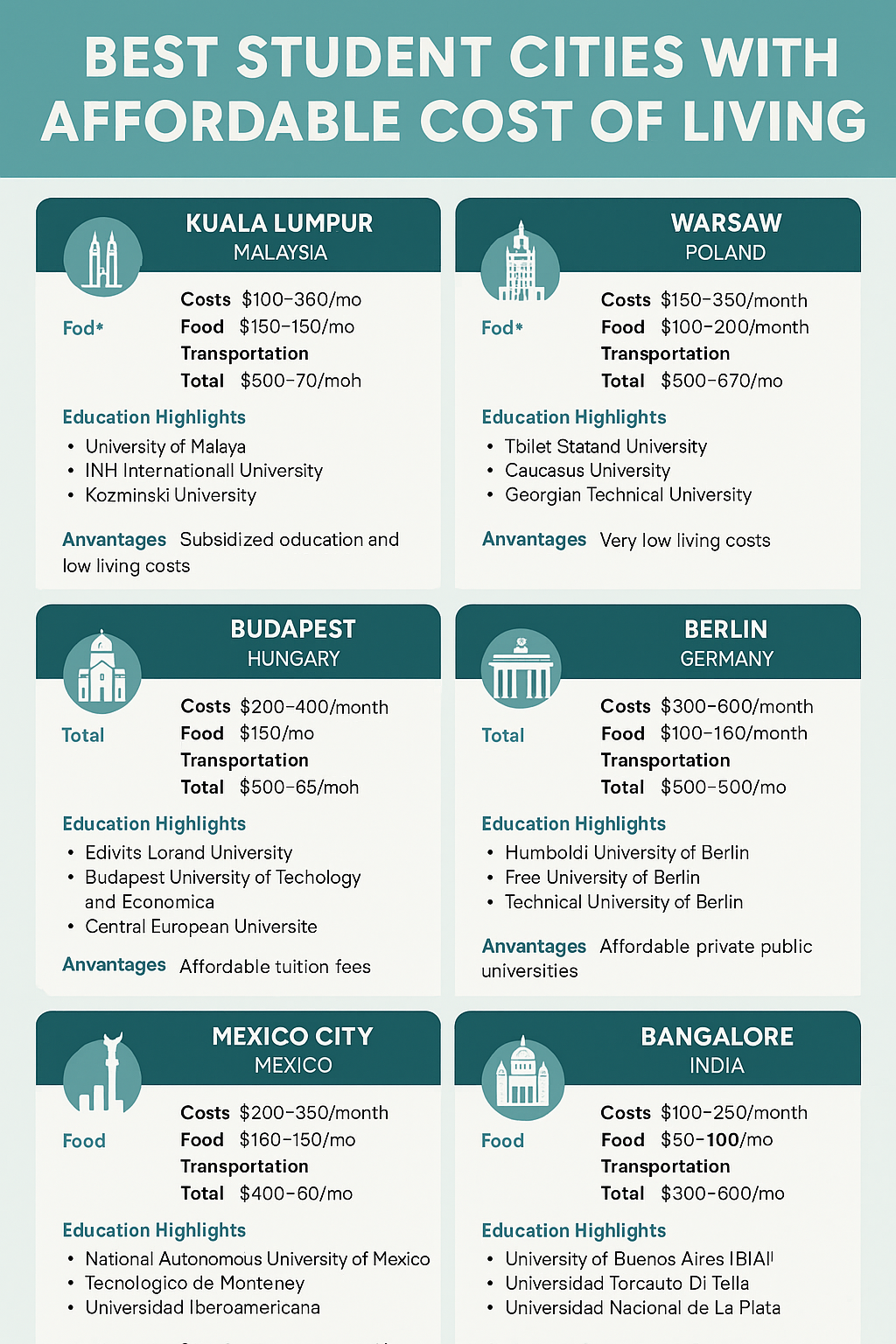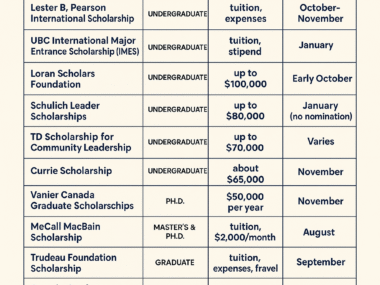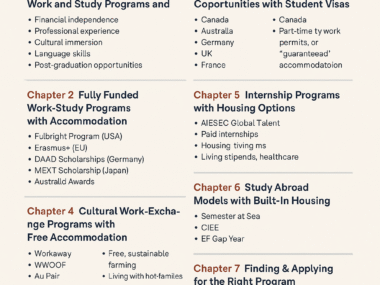TOP AFFORDABLE STUDENT CITIES
Studying abroad or even within one’s home country can be an exciting journey filled with academic exploration, cultural immersion, and personal growth. However, one of the most critical factors students must consider when choosing a destination for higher education is the cost of living. While some cities offer world-class education, they also come with high expenses that may not be suitable for students on a tight budget.
Fortunately, there are several cities around the world where students can enjoy high-quality education, vibrant student life, and relatively low costs. This article provides an in-depth analysis of the top cities with affordable costs of living, taking into account tuition, accommodation, transportation, food, part-time work opportunities, and general lifestyle.
Key Criteria for Selection
To identify the top cities for students with affordable living costs, we’ve considered the following factors:
- Average Monthly Living Cost (excluding tuition)
- Quality of Education (top universities and institutions)
- Availability of Student Discounts
- Public Transportation
- Job Opportunities for Students
- Safety and Student Support Services
- Cultural and Social Life
Let’s now explore these cities by region.
Kuala Lumpur, Malaysia
Overview:
Kuala Lumpur, Malaysia’s capital city, is becoming increasingly popular among international students. With English widely spoken, reputable universities, and an extremely affordable cost of living, it’s a prime destination for students.
Cost of Living:
- Rent: $100–$300/month (shared apartment)
- Food: $100–$150/month
- Transportation: $20–$30/month
- Total: ~$400–$600/month
Education Highlights:
- University of Malaya
- INTI International University
- Asia Pacific University of Technology & Innovation
Why It’s Affordable:
Malaysia offers subsidized education and low food and transport costs. Many universities also offer scholarships and affordable student housing.
Warsaw, Poland
Overview:
Warsaw is not only Poland’s capital but also a cultural and economic hub. It’s becoming a favorite for international students due to its affordable living and high-quality education.
Cost of Living:
- Rent: $150–$350/month
- Food: $100–$200/month
- Transportation: $15–$25/month
- Total: ~$500–$700/month
Education Highlights:
- University of Warsaw
- Warsaw University of Technology
- Kozminski University
Advantages:
- Public universities offer low or no tuition for EU students.
- Public transportation is extensive and discounted for students.
- High availability of part-time jobs for English-speaking students.
Budapest, Hungary
Overview:
Budapest, the capital of Hungary, is known for its beautiful architecture, vibrant culture, and student-friendly environment. It also offers one of the lowest living costs in Europe.
Cost of Living:
- Rent: $200–$400/month
- Food: $150/month
- Transportation: $10–$15/month
- Total: ~$500–$650/month
Education Highlights:
- Eötvös Loránd University
- Budapest University of Technology and Economics
- Central European University
Perks:
- Affordable tuition fees
- Student discounts on almost everything
- Safe and welcoming environment
Tbilisi, Georgia
Overview:
Tbilisi is emerging as a popular destination for international students, especially from Asia and Africa. The city is known for its hospitality, low cost of living, and simple visa process.
Cost of Living:
- Rent: $100–$250/month
- Food: $100–$150/month
- Transportation: $5–$10/month
- Total: ~$350–$500/month
Education Highlights:
- Tbilisi State Medical University
- Caucasus University
- Georgian Technical University
Why Tbilisi Stands Out:
- Very low living costs
- Easy immigration process
- English-taught programs widely available
Berlin, Germany
Overview:
While not the cheapest city in Germany, Berlin still offers an excellent balance of affordable living, free tuition for international students, and rich cultural life.
Cost of Living:
- Rent: $300–$600/month (shared flat)
- Food: $150–$250/month
- Transportation: $30–$40/month (with semester pass)
- Total: ~$600–$900/month
Education Highlights:
- Humboldt University of Berlin
- Free University of Berlin
- Technical University of Berlin
Benefits:
- No tuition fees for undergraduate studies at public universities
- Strong international student community
- Excellent public transportation
Mexico City, Mexico
Overview:
Mexico City is a vibrant metropolis offering culture, cuisine, and quality education at a fraction of the cost compared to Western cities.
Cost of Living:
- Rent: $200–$350/month
- Food: $100–$150/month
- Transportation: $10–$20/month
- Total: ~$400–$600/month
Education Highlights:
- National Autonomous University of Mexico (UNAM)
- Tecnológico de Monterrey
- Universidad Iberoamericana
Why It’s Great for Students:
- Affordable private and public universities
- Numerous scholarships for international students
- Affordable street food and public transit
Cairo, Egypt
Overview:
Cairo is one of Africa’s most historically rich cities and offers a unique educational and cultural experience at a very low cost.
Cost of Living:
- Rent: $100–$250/month
- Food: $100–$150/month
- Transportation: $5–$10/month
- Total: ~$350–$500/month
Education Highlights:
- Cairo University
- The American University in Cairo
- Ain Shams University
Why It’s Budget-Friendly:
- Substantially low cost of food and transportation
- Many English-taught programs
- Friendly visa policies for African and Middle Eastern students
Bangalore, India
Overview:
Bangalore, often called India’s Silicon Valley, is a top choice for students pursuing tech-related disciplines. It’s known for its educational institutions and startup culture.
Cost of Living:
- Rent: $100–$250/month
- Food: $50–$100/month
- Transportation: $10–$15/month
- Total: ~$300–$500/month
Education Highlights:
- Indian Institute of Science (IISc)
- National Institute of Fashion Technology
- Christ University
Advantages:
- Extremely low cost of food and rent
- Access to top IT companies for internships and jobs
- English is the medium of instruction
Lisbon, Portugal
Overview:
Lisbon is gaining popularity among students due to its sunny weather, relaxed lifestyle, and reasonable costs. It also offers a strategic location in Western Europe.
Cost of Living:
- Rent: $250–$450/month
- Food: $100–$200/month
- Transportation: $30–$40/month
- Total: ~$500–$700/month
Education Highlights:
- University of Lisbon
- ISCTE – University Institute of Lisbon
- NOVA University Lisbon
Why Choose Lisbon:
- Quality education and growing international programs
- Affordable living compared to other Western European capitals
- Friendly locals and welcoming environment
Buenos Aires, Argentina
Overview:
Known as the “Paris of South America,” Buenos Aires is culturally rich and relatively affordable for students. Many public universities are tuition-free.
Cost of Living:
- Rent: $150–$300/month
- Food: $100–$150/month
- Transportation: $10–$15/month
- Total: ~$400–$600/month
Education Highlights:
- University of Buenos Aires (UBA)
- Universidad Torcuato Di Tella
- Universidad Nacional de La Plata
Benefits:
- No tuition fees at public universities
- Thriving arts and music scene
- Spanish language immersion opportunities
Tips for Students to Manage Costs Efficiently
Whether you choose to study in Kuala Lumpur or Berlin, here are some practical tips to make the most of your student budget:
1. Opt for Shared Accommodation
Sharing an apartment with fellow students cuts costs significantly.
2. Cook Your Meals
Dining out daily adds up fast. Cooking saves money and improves health.
3. Use Student Discounts
Always carry your student ID—many cities offer transport, food, and entertainment discounts.
4. Take Advantage of University Services
Use campus gyms, libraries, and mental health services to save on external costs.
5. Work Part-Time (Legally)
In most countries, international students can work 10–20 hours/week. This income helps cover essentials.
Conclusion
Choosing the right city for your studies is a decision that impacts both your academic success and your financial well-being. The cities listed above offer a balanced combination of quality education and affordability. From the cultural vibrancy of Buenos Aires to the student-friendly atmosphere of Budapest, these cities make it possible to study without incurring enormous debt.
When planning your academic journey, be sure to factor in not only tuition costs but also everyday living expenses, access to part-time jobs, and quality of life. Affordable cities don’t mean compromising on education or experience—in fact, many offer unparalleled opportunities for growth, cultural immersion, and networking.
So whether you’re looking for adventure in Asia, quality education in Europe, or vibrant culture in Latin America, you can find a student city that suits your budget and academic goals. The world is open—go explore it wisely.
![]()




